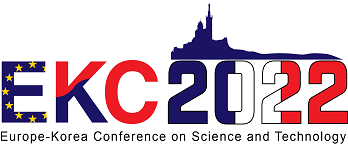PROGRAMME
Basic Science
Basic science aims at discovering new phenomena, understanding the microscopic principles and providing useful knowledge for future developments. For this, it is important to keep up-to-date with the latest progress, look at the problems from different perspectives, and establish international networks. To this end, Basic Science Group plans to bring together Korean and European Scientists and Engineers by organizing following sessions at EKC2022.
At first, in the Poster Session, delegates from all research area of Basic Science (Mathematics, Physics, Chemistry, Earth science, etc.) are invited to present their own research works, learn each other's expertise, and develop collaborative networks. In the Talk Sessions, experts and key persons in the selected research area (listed below) will introduce the field and discuss current main issues and new developments.
Session 1. Climate Changes of the Oceans
Session 2. Experimental and theoretical studies on molecular electronic states, potential energy and properties
Session 3. Machine Learning based Disease Predictions and Industrial Problem Solving
Combined session
BS/LH: Mathematical modeling and K-quarantine of novel and variant infectious diseases
CM/BS: 2D and Nanomaterials, their Fundamentals and Applications
In addition to these sessions, delegates are also encouraged to participate in the sessions of their own interests organized by other Science & Technology Groups. Through these events, organizers of EKC2022 wish to provide an unparalleled opportunity for Korean and European Scientists and Engineers to establish a valuable and prolonged network.
Programme Committee
| Date / Time | 2022-07-20 13:30 -- 15:00 |
|---|---|
| Room | Salle 50 |
| Conveners / Chairs |

PROF. JEUNG, Gwang-hi
Aix-Marseille University, Marseille, France |
| Synopsis | Excited electronic states of molecules show various aspects that are very different from the ground electronic states. These states accessible by photons, electron impacts or molecular collisions, can be studied by modern spectroscopical techniques often using tunable visible/uv lasers. They can also be studies by theoretical calculations using the first-principle (ab initio) methods or by semi-empirical methods. The aim of this session is to gather experimentalists and theoreticians to present recently found new aspects of the excited states and to discuss possible collaborations between researchers in physics and chemistry.
|
| Speakers |
|
| Date / Time | 2022-07-20 15:20 -- 18:40 |
|---|---|
| Room | Salle 50 |
| Conveners / Chairs |

PROF. PARK, Young-hyang
LOCEAN, Sorbonne Univ-CNRS-IRD-MNHN 
DR. CHOI, Yujin
Research Engineer CNRS Institut Physique du Globe de Paris (IPGP), Paris University |
| Synopsis | Under the global warming climate change, the world’s oceans are currently absorbing more than one quarter of anthropogenic CO2 emitted to the atmosphere and more than 90% of the excess heat caused by greenhouse gas warming since the mid-20th century. This causes important alterations in the circulation, temperature, and chemical composition of the oceans. For instance, surface waters have warmed by 0.7°C per century since 1900 and a global increase in sea surface temperature of up to 3°C is projected by 2100. The potential weakening of the Atlantic Meridional Overturning Circulation, of which the Gulf Stream controlling the European climate is one component, has been suggested due to increased fresh water inputs by accelerating ice melting in the Arctic Ocean and its surrounding lands. The excess absorption of CO2 by the oceans makes them more and more acidic, with detrimental impacts to marine ecosystem, such as the accelerated coral breaching and destruction of shellfish fisheries. Stronger westerlies close to the Antarctic continent are also projected in the Southern Ocean, which could induce the increased upwelling of warm deep circumpolar water and its penetration under the Antarctic ice shelves, with the potential acceleration in the collapse and melting of Antarctic coastal glaciers, eventually contributing to a global sea level rise, greatly menacing much-populating near-coast modern cities.
This session invites the presentation of works from the observations, analysis of historic or reanalysis data, and modeling of the world’s oceans and their climatic changes at different scales of time and space. All contributions related to the ocean, including the solid Earth beneath the ocean, the atmosphere above the ocean, the biosphere within the ocean, and their mutual interactions will be appreciated. Results from European-Korean cooperative works in various ocean basins are particularly welcome. |
| Speakers |
|
| Date / Time | 2022-07-21 13:30 -- 15:00 |
|---|---|
| Room | Salle 50 |
| Conveners / Chairs |

PROF. LEE, Hyojung
Kyungpook National University 
DR. CHOI, Sunhwa
National Institute for Mathemtical Sciences |
| Synopsis | There have emerged several coronaviruses, namely SARS-CoV, MERS-CoV, and SARS-CoV-2 within two decades. These coronaviruses as well as novel variant viruses are extremely dreadful and getting more serious as a global threthen. Moreover, the fast spread of misinformation about the outbreak causes worldwide panic.
To prevent the spread of infectious disease, Republic of Korea has adopted a local quarantine strategy rather than a global lockdown to effectively prevent the spread of diseae while minimizing economic damage. In order to give a scientific information, Analysis of epidemiological data and mathematical modeling were used to predict the spread of COVID-19 and make policy decisions. In addition, mathematical modeling can be analyzed to evaluate the effectiveness of control interventions, including pharmaceiutical intervention such as vaccination and antiviral treatment and non-pharmaceiutical intervention such as social distancing, face mask use, contact tracing.
In this session, we would like to introduce the situation of COVID-19 in Korea and the “K-quarantine” practiced at each period. Furthermore, we analyze the transmission dynamics along with control interventions of “K-quarantine” by usign mathematical modeling. Finally, we assesse the effect of th control strategies on the spread of infectious disease.
|
| Speakers |
|
| Date / Time | 2022-07-21 15:20 -- 16:55 |
|---|---|
| Room | Salle 50 |
| Conveners / Chairs |

DR. HA, Taeyoung
Chief director, National Institute for Mathematical Sciences 
PROF. KIM, Young Rock
Hankuk University of Foreign Studies |
| Synopsis | Artificial intelligence (AI) technology based on machine learning is rapidly developing, and based on this, new researches are being conducted in all fields, and many important achievements are being derived. The medical area is the most important one of application of AI technology in science, and these kind of research on disease prediction provides an opportunity to change the quality of human life. We are actively using AI technology to develop disease prediction and diagnosis models. Also, we are doing researches on mathematical science-based technologies to achieve this goal.
In addition, the effective performance through the use of AI has a great impact on the industry. Much attention and effort are being put into the development of methodologies that effectively solve current issues occurring in the industry field.
In this session, disease prediction models developed using AI in the medical field and problem-solving methodologies will be introduced with their results. In particular, we explains a exploratory data analysis of table-type data which are produced in the process of diagnosis and treatment of various diseases, and the quality improvement technology through machine learning-based for noise removal of medical image data. We also introduce machine learning technology including deep learning methods for establishing/developing disease prediction models. Finally, we introduce how to define industrial problems and machine learning based solutions. |
| Speakers |
|
| Date / Time | 2022-07-21 13:30 -- 15:00 |
|---|---|
| Room | Lacydon |
| Conveners / Chairs |
|
| Synopsis | Nowadays, an agenda for sustainable development is supposed to be achieved by the year 2030 and a total of 17 global goals were set to attain sustainable development. In particular, nanomaterials have a key unprecedented role to play in these goals owing to recent advances in nanotechnology. Engineering functional nanomaterials and their products have emerged as potential replacements to conventional disposable materials, toxic chemicals, and noble metals. In line with this trend, the electronic industry has experienced a paradigm shift, which is that global companies are no longer only betting on pursuing cutting-edge performance but taking strict precautions against unforeseen environmental, economic, and social risks. In other words, the unique properties and functionalities of engineered nanomaterials lead to a technological edge that can greatly enhance future value by solving global sustainability challenges (e.g., ecotoxicity, resource monopoly, scarcity, human healthcare, etc). As nanomaterials vary significantly in properties and functionalities, their applications are endless as well across almost all fields of scientific research and industrial applications.
Proposed topics in this session are as follows.
- Nanomaterials: physical, chemical, and fundamental properties.
- Nanomaterials for electronic, optoelectronic, and photonic applications.
- Nanomaterials for environmental monitoring, treatment, and remediation.
- Nanomaterials for food, agriculture, and biomedical.
- Nanomaterials: not limited to the above fields. |
| Speakers |
|


